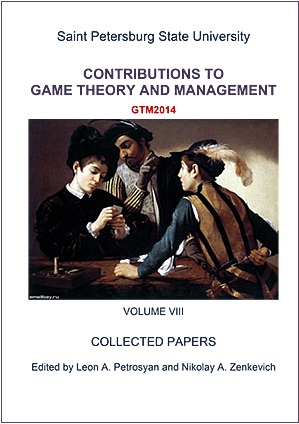Quantum Entanglement in a Zero-Sum Game
Abstract
We consider a class of simple games that emphasizes one important aspect of the game of bridge: what a player consisting of two persons (in terms of (von Neumann and Morgenstern, 1953)) can do when the direct communication is prohibited between them, and how they play against their opponent acting under similar circumstances. We find optimal strategies for this class of games and show how the effect of quantum nonlocality can improve the players' performance.
Quantum nonlocality, or quantum entanglement, is widely known in quantum game theory. In some games, the payoff of players properly equipped with entangled quantum bits can be up to exponentially bigger in comparison with ordinary players. However, all known nonlocal games are quite artificial and, besides, they are fully “cooperative”: there are no opponents as such, but all players should strive for the same goal. The introduced game favorably differs from them. Firstly, it has been derived from quite natural problem (the game of bridge); secondly, there is an apparent presence of competition in the game (because it is a zero-sum one!); and, finally, its analysis does not require deep understanding of the heavy mathematical formalism of quantum information theory.
Downloads
References
Downloads
Published
How to Cite
Issue
Section
License
Articles of "Contributions to Game Theory and Management" are open access distributed under the terms of the License Agreement with Saint Petersburg State University, which permits to the authors unrestricted distribution and self-archiving free of charge.




